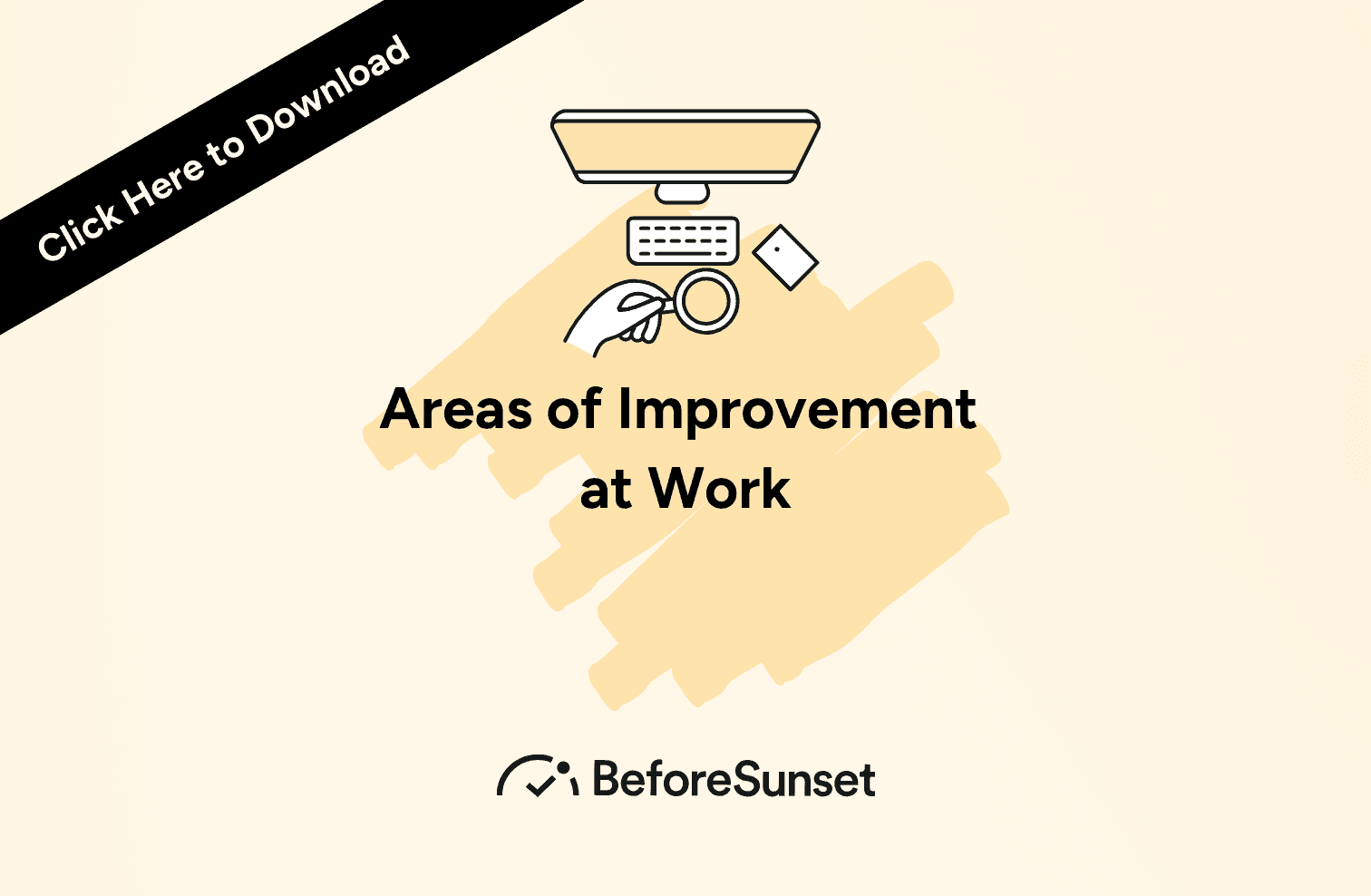It might be essential to identify primary areas of improvement that make for a highly effective contributor and, consequently, a successful career, whether you're presenting a planned performance review or ongoing feedback to your team members.
It's also good to tailor your comments to each individual based on their demonstrated effect, progress, and overall performance. These points also apply to us as individuals at the end of the day. Here are 13 tips for areas of improvement at work!
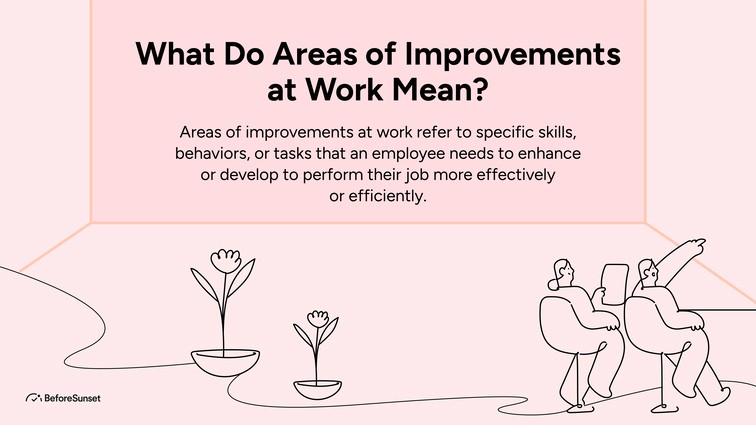
What Do Areas of Improvements at Work Mean?
Specific aspects of an employee's work performance that need to be improved or developed are referred to as "areas of improvement". Managers or supervisors identify these areas via performance reviews, goal-setting sessions, or through continuing feedback.
Communication skills, time management, technical skills, collaboration, problem-solving skills, leadership traits, and any other talent or quality necessary for success in a specific career or sector may be areas that need development.
It is normal practice in the workplace to identify areas that need development. This gives employees the chance to get feedback on how they are doing and to work on developing their skills and talents. Employees may increase their effectiveness, efficiency, and value to their business by concentrating on areas that need development.
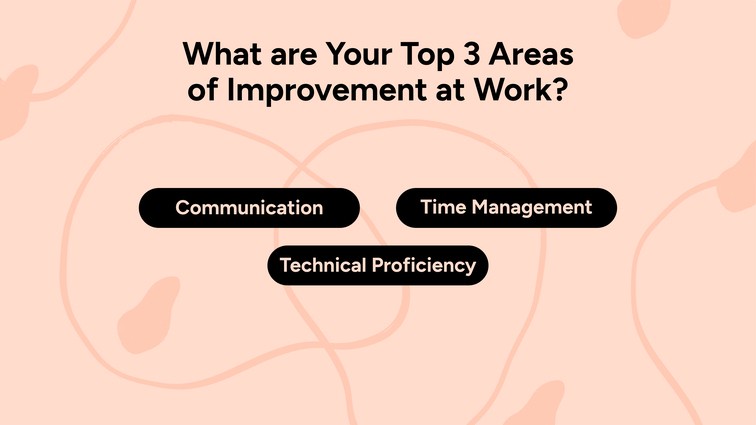
What are Your Top 3 Areas of Improvement at Work?
Because the areas for improvement can vary depending on the job role, industry, and individual circumstances, it is challenging to give a general answer to this question. To improve their performance at work, many people might concentrate on the following three typical areas for improvement:
Communication: Effective communication is crucial for success in any profession. This might involve developing your capacity for coherent and succinct thought expression, engaging in active listening, providing and receiving constructive criticism, and changing your communication style to suit various audiences.
Time Management: Effective time management is essential to meeting deadlines, finishing work, and attaining goals. This might entail prioritizing tasks, making timetables, removing distractions, assigning duties, and refraining from procrastinating.
Technical Proficiency: Many occupations need for technical knowledge and competence with certain tools, software, or equipment. By remaining informed about the most recent trends and advancements in their industry, participating in training sessions, looking for mentoring or coaching, and engaging in hands-on learning, employees may improve their technical abilities.
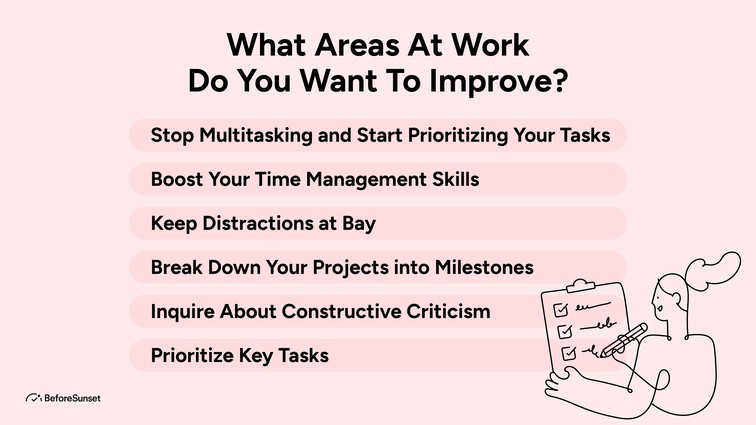
What Areas At Work Do You Want To Improve?
Human beings are always looking for methods to develop both personally and professionally. In order to gain more success, pleasure, and advancement in our jobs, we could discover that there are specific areas we wish to improve. The first step in developing a plan for self-improvement and ultimately reaching our objectives might be identifying these areas.
In this section, we'll look at some of the typical workplace areas where individuals would desire to make improvements and talk about how to find and address these areas productively. This blog will offer insightful information and practical advice for developing your talents and abilities, regardless of your stage in your career or experience level.
1- Stop Multitasking and Start Prioritizing Your Tasks
Multitasking is commonplace in the workplace. Suppose you work in a busy agency, for example. In that case, it's not uncommon for you to handle interactions with possible customers, speak with various contractors, and manage and review work from freelancers while also doing your regular job.
While you may believe that by doing so, you would be able to do more work, what you are doing affects the quantity and the quality of your work.
Rather than juggling four to five tasks simultaneously, prioritize them and concentrate on each one separately.
You will not only be able to deliver better quality work since you will be able to focus on a single issue, but you will also be able to complete your task faster and more efficiently.
Refuse any tasks that may divert your attention away from your primary responsibilities, or inform your manager/boss that you cannot multitask properly.
2- Boost Your Time Management Skills
When starting a new project, effectively managing your time is crucial. You don't have much time to squander on a project because you only work 40 hours per week, and they all have deadlines.
So, if your job performance isn't up to par, working on your time management will significantly increase workplace productivity.
You can easily make a schedule for yourself or your team ahead of time using BeforeSunset AI.
You'll have more time to properly organize your time for each project before you start working on it this way, and you can see how much time each task takes to complete. This way, you can avoid unneeded random distractions.
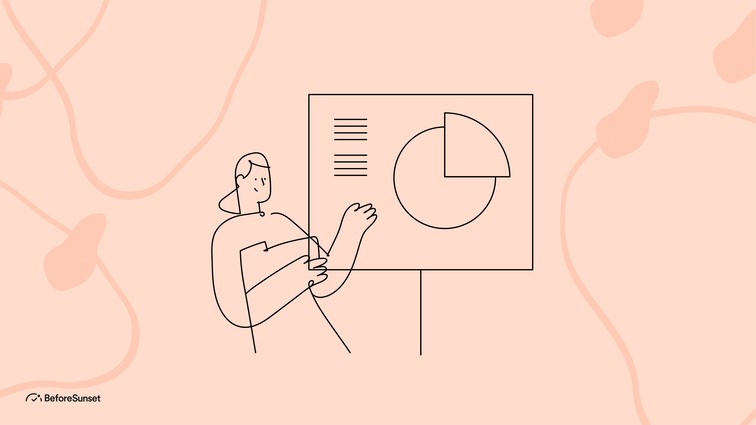
3- Keep Distractions at Bay
According to a report on workplace distraction, 54% of workers get distracted by not performing as well as they should, and 50% get distracted by thinking that they're significantly less productive.
It's easy to become sidetracked and put off work momentarily. While this isn't a problem, it might lead to a drop in performance if it happens too frequently due to the added stress.
Consequently, to produce exceptional work-related outcomes and maintain attention during working hours, you must first learn where good distractions originate and minimize exposure.
You can also turn your phone off or put it in do not disturb mode. Schedule work and relaxation periods if you find it difficult to turn off your phone completely. For instance, you get a 10-minute phone break for every hour of work.
Over a few weeks, you can gradually increase your work time while reducing your time spent on your phone.
To reduce distractions from around the office, you can also work in a quiet area or use headphones. Provide yourself with a variety of incentives. This way, you'll be motivated to finish your assignment, which will keep your mind from wanting to do something else.
4- Break Down Your Projects into Milestones
You can remain on track and accomplish your goals more quickly by breaking down your tasks into milestones. The actions you may take to divide your projects into milestones are listed below:
Determine the main objective: Establish the primary goal of your project before anything else. Your project will have a clear focus and direction as a result.
Identify the main tasks: Dissect the project into the main tasks that must be accomplished to get the end result. These assignments ought to be clear, quantifiable, and doable.
Separate each work into manageable chunks: Determine the precise measures that must be taken to accomplish each important assignment. These actions must to be specific and doable in a short amount of time.
Give each milestone a due date: Establish a deadline for each milestone, making sure that each deadline can be met within the project's schedule.
Review and modify frequently: To make sure you are on schedule to complete the project in a timely manner, evaluate your milestones often. The schedule or stages should be adjusted as required to account for any unforeseen problems that could occur.
Your project may be managed and tracked more easily if you divide it up into milestones, which will also help you remain on schedule to reach your objective. You can guarantee that your project will be finished on time and to a high level by adopting a methodical approach and identifying attainable goals.
5- Inquire About Constructive Criticism
Have you lately finished a new project and aren't sure what to think of your job performance?
Ask your boss or manager for some constructive criticism. Typically, they will be delighted that you asked and will happily present you with some suggestions for improvement and commend you on all you have done well.
Asking for constructive feedback is a crucial step on the path to both professional and personal development. Feedback that is meant to be constructive and encouraging, with the purpose of enhancing your performance and assisting you in reaching your objectives, is known as constructive criticism.
6- Prioritize Key Tasks
As an employee, you will frequently have a variety of duties that you must complete by a specific date.
It is typical to have more duties than you can handle; thus, prioritizing your activities is the best method to ensure that you retain your job performance.
When do the projects have to be completed? If you have an assignment due in a week and another due in two months, focus entirely on the one due in a week.
Your work performance will be at its peak, and you will be able to fulfill the deadlines effortlessly.
If time isn't an issue, consider which one will have the most negative influence on you or your company. If you do it quickly, then you can easily prioritize the tasks.
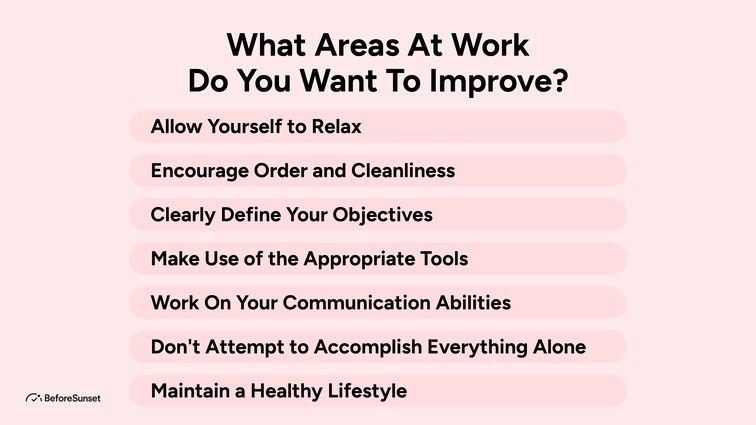
7- Allow Yourself to Relax
Mental health is a serious issue, and it is easy to 'burn out' or become uninspired at work after working for a long time.
Fortunately, you don't have to work for 8 hours straight every day, giving you many opportunities to relax and recharge during your workday.
Short breaks also improve your attention and productivity. You may accomplish this by just drinking coffee and watching your favorite Netflix program for 10-15 minutes, or you can perform some yoga or take a little workout break if time allows. If you're feeling exhausted, take a day off or perhaps a week off.
8- Encourage Order and Cleanliness
You have to prove that working in a cluttered environment reduces productivity. Finding what you need when the time comes might be a time-consuming task if you have hundreds of documents strewn around your workstations.
To avoid such time-wasting horrors, keep your desk tidy and well-organized throughout the day.
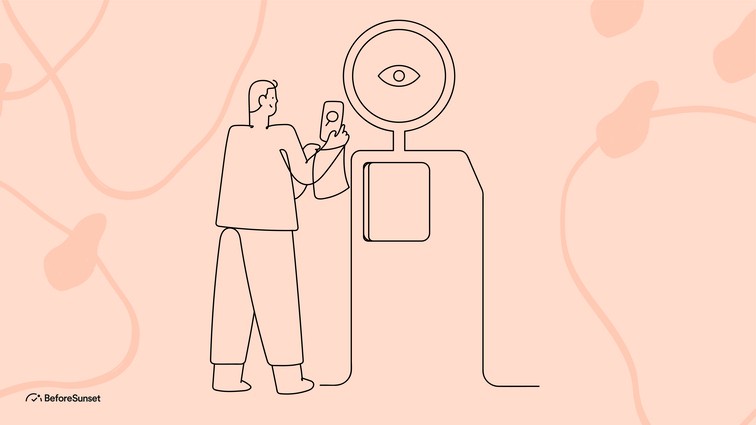
9- Clearly Define Your Objectives
Everyone wants to improve as rapidly as possible in their career, but unfortunately, this is not a realistic goal.
Don't overburden yourself while setting objectives for initiatives that are about to begin; the last thing you want is to burn out halfway through.
Instead, think about your talents, and your working capacity. Then, create realistic goals. You'll be astonished at how much setting clear and attainable objectives will boost your productivity.
10- Make Use of the Appropriate Tools
If you operate in the product or service business, one of the leading causes of poor performance might be a lack of understanding of the tools and resources you're using.
Typically, your business would have tried a few tools and presented you with the best ones well before you started working. As a result, if you want to be more productive at work, you need to learn how to use the tools that will help you do so.
As BeforeSunset AI comes into play as a productivity tool.Anyone wishing to increase their productivity and efficiency can use BeforeSunset. It can benefit you whether you're a professional, freelancer, or student in a number of ways.
For instance, it may assist you in organizing your work and setting priorities for your duties, allowing you to initially concentrate on the most crucial and pressing job.
It can also help you manage your time by allowing you to keep track of your time and find opportunities to increase your productivity. You may focus on your job uninterrupted by interruptions by using productivity tools to reduce distractions.
Using the tool you need will make your job relatively more effortless and more accessible if required; therefore, you can create additional opportunities for yourself to grow.
11- Work On Your Communication Abilities
If you're working on a large project with a group of coworkers, communication will be critical to the team's overall success. As a result, ensuring that you communicate with them about everything from the good to the negative will be essential to completing the assignment successfully.
12- Don't Attempt to Accomplish Everything Alone
You should nearly never work on a single project alone unless you are a jack of all crafts in your business. Why? Because, unless it's straightforward and obvious, it can need a distinct set of skills that you don't have.
Consider a big project such as constructing an office building: you'll need architects, civil engineers, workers, project managers, security, a finance team, and so on to complete a project. None of these skills are in one person alone, and this mindset is quite proper for big projects. Communicate with your team and the necessary people to accomplish goals.
13- Maintain a Healthy Lifestyle
Nobody can be productive at work if they are sick. Thus you must look after your health.
It's natural to feel fatigued after a long day at work, leaving you with little drive to go to the gym or perform an activity. However, you do not need to go to the gym every day. All you have to do is walk or ride your bike to work, restrict you're snacking throughout the day, and stick to healthier selections.
Then your mood will improve, your attention will sharpen, and your work performance will improve.
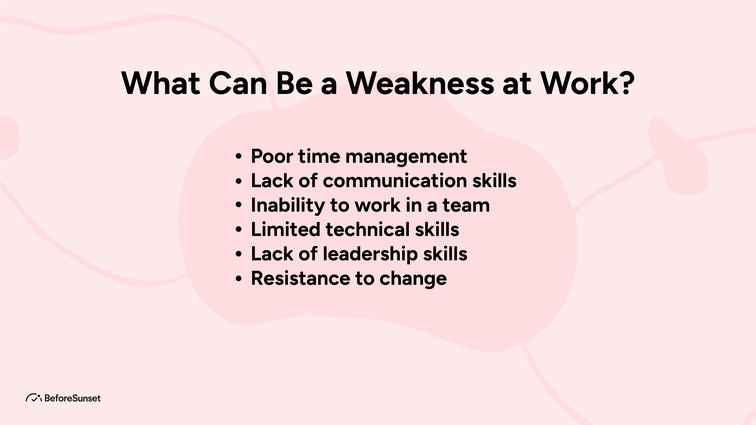
What Can Be a Weakness at Work?
Any area where a person struggles or performs below expectations, whether in terms of job performance or professional growth, can be considered a weakness at work. Poor time management, trouble working in a team, disorganization, poor communication skills, aversion to change, and difficulties adjusting to new technology or procedures are some frequent workplace problems.
Being weak at work is not always a bad thing, it's vital to remember that. It's common for us to have room for improvement as human beings. In reality, recognizing and improving our areas of weakness can help us advance professionally, ultimately resulting in more success in our jobs.
Finding our shortcomings and proactively addressing them is the key. This might entail asking coworkers or superiors for feedback, enrolling in training or professional development programs, or collaborating with a coach or mentor to create improvement initiatives. Even our shortcomings may develop into strengths over time with hard work and a desire to learn and change.
How Can I Improve Myself Professionally?
Professional development may be a lifelong endeavor, but there are certain crucial tactics you can employ to begin going and go forward:
Set goals: Identify your areas of strength and growth, then set yourself some precise, attainable goals. This may keep you motivated and engaged while also allowing you to track your progress.
Request feedback: Consult with coworkers, superiors, or mentors to learn more about your strengths and areas for development. Be receptive to criticism that is offered with suggestions, and see it as a chance to improve.
Build your skills: Utilize the training and professional development opportunities available to you, both inside and outside of your organization. By doing so, you may develop the skills you need to grow in your profession as well as keep current on market trends and best practices.
Network: Establish connections with colleagues and business leaders, both online and offline. To increase your expertise and make connections with new prospects, attend conferences, join professional groups, and interact with individuals in your area.
Be proactive: Proactively seek out methods to enhance procedures or address issues in your business. This might distinguish you from your colleagues and show your worth and leadership potential.
Embrace feedback: Accept and welcome comments without hesitation, whether it's favorable or bad. Positive criticism can advance your professional development.
Keep in mind that professional growth is a journey rather than a finish line. It calls for commitment, diligence, and a readiness to pick things up quickly and change as you go. You may advance and accomplish your objectives by implementing these techniques into your daily routine, both in your present position and in your long-term professional aspirations.
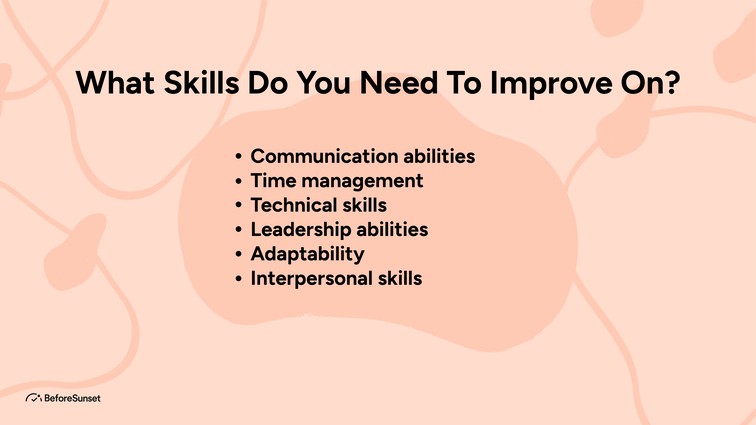
What Skills Do You Need To Improve On?
The particular talents that a person needs to develop may vary based on their sector, work function, and personal objectives. The following are some typical abilities that many people might need to develop:
Communication abilities: These comprise active listening abilities as well as verbal and written communication abilities. Success in many businesses depends on the ability to communicate effectively with coworkers, clients, and other stakeholders.
Time management: Setting priorities, setting deadlines, and completing goals all depend on efficient time management. Delegation, planning, and organizing abilities are required for this.
Technical skills: Success in many fields depends on possessing excellent technical abilities. Skills like coding, data analysis, and digital marketing are included in this.
Leadership abilities: Even if you're not in a management position, possessing leadership abilities like problem-solving, emotional intelligence, and decision-making may help you succeed at work and develop in your career.
Adaptability: The capacity to learn new skills, operate in various contexts, and adjust to changing situations is becoming more and more crucial in today's quickly changing labor market.
Interpersonal skills: Success in many occupations requires the ability to work well with people, form connections, and cooperate successfully.
You may boost your professional talents, improve job happiness, and reach your career objectives by determining the exact skills you need to acquire and taking proactive efforts to do so.
How Do You Answer Areas of Improvement on Self Evaluation?
A self-evaluation's areas of improvement inquiry should be answered honestly, specifically, and with examples. Try to be more precise about the exact areas within that skill that you need to work on rather than just stating broad areas for development.
Additionally, give instances where you struggled or failed to meet expectations to show that you are self-aware and to give context for your weaknesses. It's crucial to include a strategy for how you intend to fix these problems, such as enrolling in training programs, asking for input from coworkers, or collaborating with a mentor or coach.
While it's important to be aware of your shortcomings, don't just concentrate on the bad; also emphasize your positive qualities and the development you've made in other areas. You may successfully respond to the areas for improvement question on a self-evaluation and show your dedication to personal and professional development by following these recommendations.
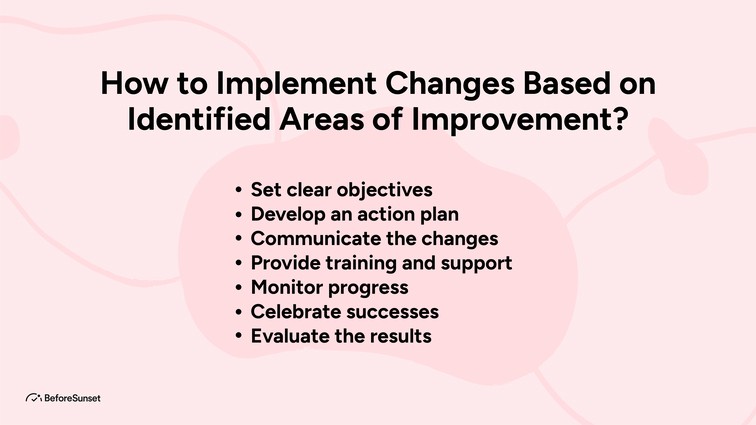
How to Implement Changes Based on Identified Areas of Improvement?
A critical element in the process of professional growth and development is putting adjustments into action based on areas that need better. It's critical to adhere to a systematic approach in order to make changes successfully. Setting precise, quantifiable, and realistic goals for each area that needs development is the first step.
This will enable you to direct your efforts and monitor your development. Create an action plan that details the precise activities you must take to accomplish each goal next. Specific deadlines, checkpoints, and metrics for gauging progress should be included of this strategy. It's critical to divide each objective into manageable chunks that can be readily completed.
Include others, such as coworkers, mentors, or coaches, who can offer feedback, support, and accountability throughout the process, in order to assure success. Finally, monitor your development and make any necessary adjustments.
Celebrate your victories and take lessons from your failures in order to better your strategy and outcomes. You may successfully execute changes based on identified areas for development and accomplish your professional goals by adhering to these guidelines.
What CEOs Can Do to Improve Work for Employees
CEOs play a crucial role in fostering a positive work environment and enhancing employee performance.
By focusing on leadership skills and professional skills, they can create opportunities for improvement that benefit both the organization and its workforce. Here are some key strategies CEOs can implement:
1. Provide Constructive Feedback and Regular Feedback
Offering constructive feedback is essential for career growth and career advancement. CEOs should ensure that feedback is specific, timely, and aimed at helping employees develop their essential skills and soft skills.
Schedule regular one-on-one meetings to discuss performance and provide positive feedback.
Use project management tools to track progress and identify areas for improvement for employees.
2. Enhance Organizational Skills and Active Listening Skills
Effective organizational skills and active listening skills are vital for maintaining a productive work environment. By practicing active listening and fostering interpersonal communication, CEOs can better understand employee needs and concerns.
Implement strategic thinking sessions to align team goals with organizational objectives.
Encourage interpersonal communication through team-building activities and open forums.
3. Develop Strong Problem-Solving Skills and Critical Thinking
CEOs should model strong problem-solving skills and critical thinking to inspire their teams. These crucial skills help in addressing challenges and finding creative solutions to complex problems.
Host workshops to develop creative skills and critical skills among employees.
Encourage brainstorming sessions to generate a wide range of ideas.
4. Delegate Tasks and Set Realistic Deadlines
Delegating tasks effectively and setting realistic deadlines are important for managing workload and reducing stress levels. This approach ensures that employees can achieve achievable goals without feeling overwhelmed.
Use project management tools to assign and track tasks.
Set realistic deadlines that consider employee capacity and project requirements.
5. Promote a Positive Work Environment and Career Advancement
Creating a positive work environment is key to maintaining high employee performance and job satisfaction. CEOs should focus on opportunities for career advancement and recognize employee achievements.
Establish a reward system for meeting team goals and common goals.
Provide training programs to enhance customer service skills and other professional skills relevant to the current role.
By focusing on these strategies, CEOs can significantly improve the work environment and foster improvement for employees. This not only enhances employee performance but also contributes to the overall success of the organization.
Some Last Words From Us
People who are challenged to achieve health are more engaged and content with their professions, so professional development is crucial. People are more likely to advance in their careers and become more effective contributors over time if they feel supported by their leadership with positive and constructive criticism.
Therefore tracking a team's and project's progress is one of the key takeaways if you want to see the growth potential of both yourself and your team members.
We can help you out with that! Try BeforeSunset AI now and see if it's the tool you need.
